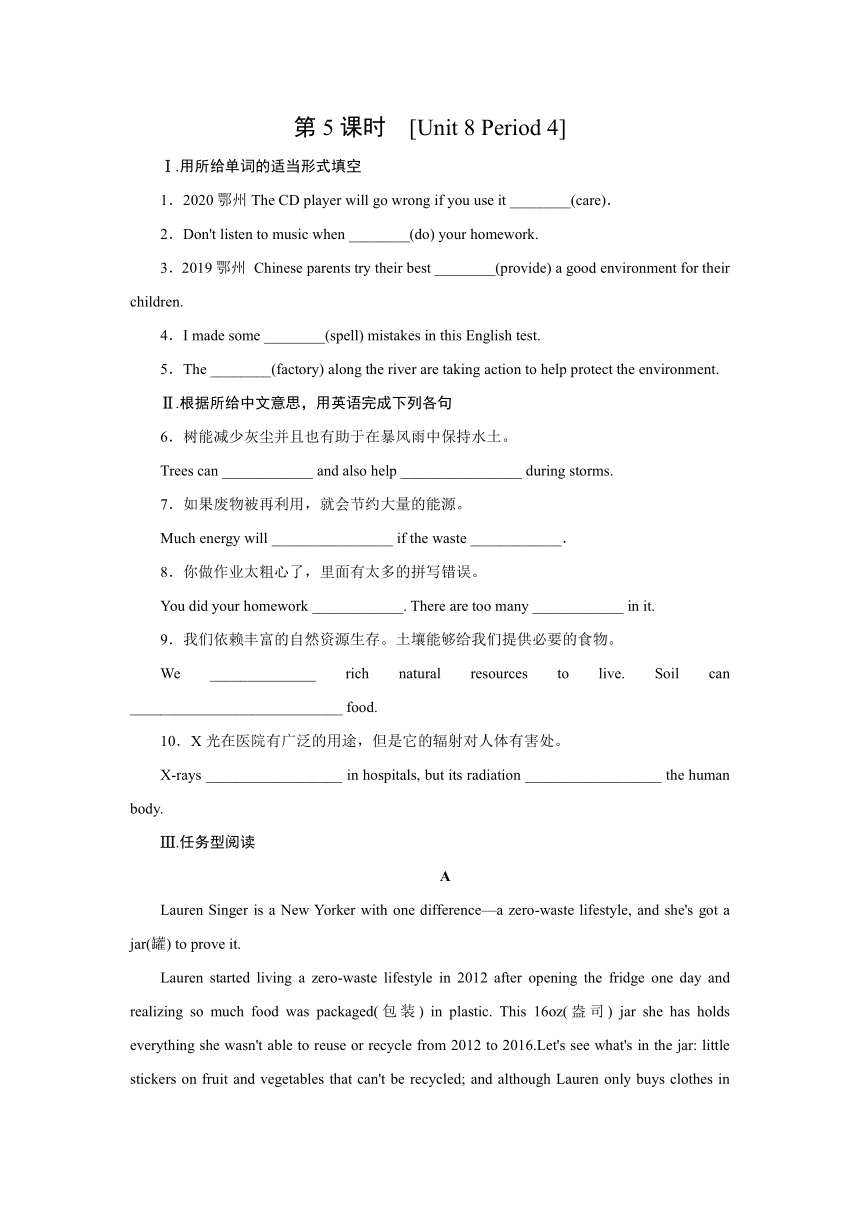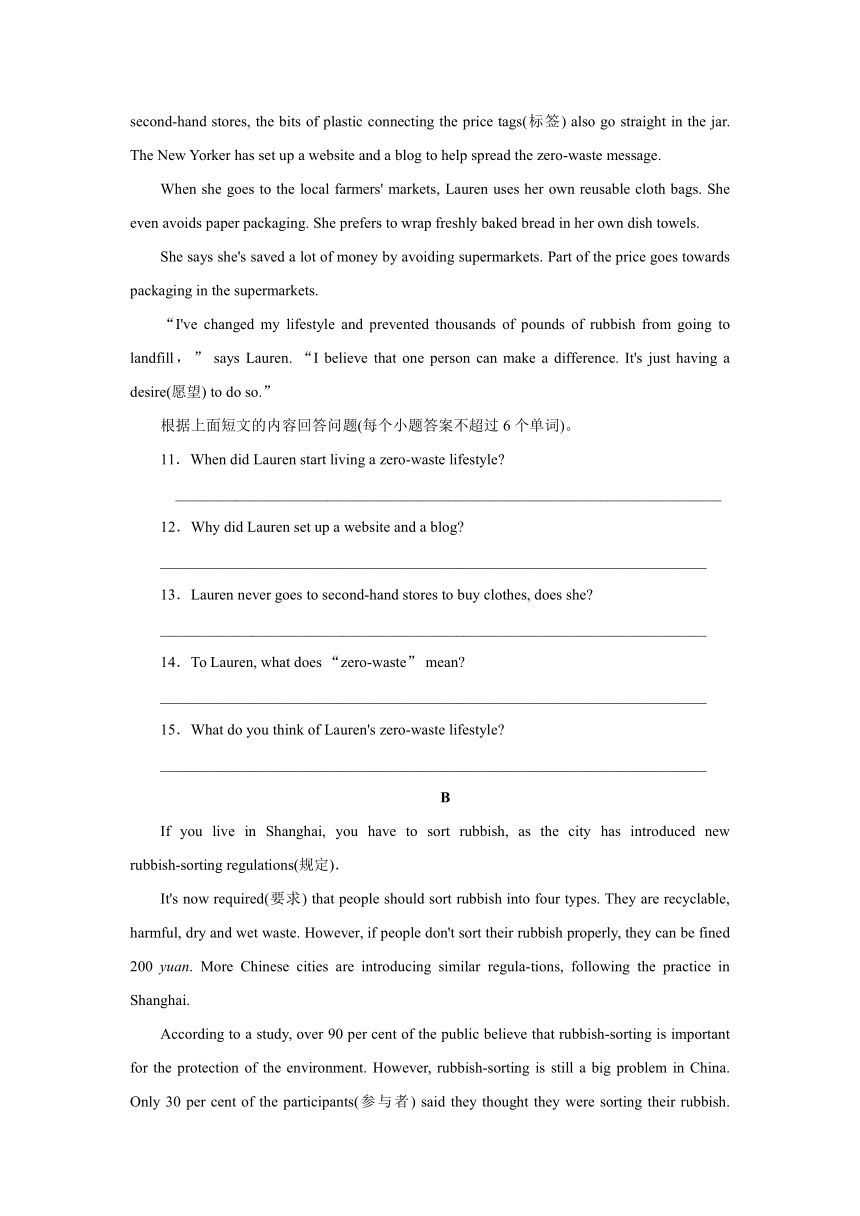牛津译林版英语八年级下册课课练:Unit 8 A green world Period 4(含答案)
文档属性
| 名称 | 牛津译林版英语八年级下册课课练:Unit 8 A green world Period 4(含答案) |  | |
| 格式 | docx | ||
| 文件大小 | 47.1KB | ||
| 资源类型 | 教案 | ||
| 版本资源 | 牛津译林版 | ||
| 科目 | 英语 | ||
| 更新时间 | 2022-07-20 11:11:13 | ||
图片预览


文档简介
第5课时 [Unit 8 Period 4]
Ⅰ.用所给单词的适当形式填空
1.2020鄂州The CD player will go wrong if you use it ________(care).
2.Don't listen to music when ________(do) your homework.
3.2019鄂州 Chinese parents try their best ________(provide) a good environment for their children.
4.I made some ________(spell) mistakes in this English test.
5.The ________(factory) along the river are taking action to help protect the environment.
Ⅱ.根据所给中文意思,用英语完成下列各句
6.树能减少灰尘并且也有助于在暴风雨中保持水土。
Trees can ____________ and also help ________________ during storms.
7.如果废物被再利用,就会节约大量的能源。
Much energy will ________________ if the waste ____________.
8.你做作业太粗心了,里面有太多的拼写错误。
You did your homework ____________. There are too many ____________ in it.
9.我们依赖丰富的自然资源生存。土壤能够给我们提供必要的食物。
We ______________ rich natural resources to live. Soil can ____________________________ food.
10.X光在医院有广泛的用途,但是它的辐射对人体有害处。
X rays __________________ in hospitals, but its radiation __________________ the human body.
Ⅲ.任务型阅读
A
Lauren Singer is a New Yorker with one difference—a zero waste lifestyle, and she's got a jar(罐) to prove it.
Lauren started living a zero waste lifestyle in 2012 after opening the fridge one day and realizing so much food was packaged(包装) in plastic. This 16oz(盎司) jar she has holds everything she wasn't able to reuse or recycle from 2012 to 2016.Let's see what's in the jar: little stickers on fruit and vegetables that can't be recycled; and although Lauren only buys clothes in second hand stores, the bits of plastic connecting the price tags(标签) also go straight in the jar. The New Yorker has set up a website and a blog to help spread the zero waste message.
When she goes to the local farmers' markets, Lauren uses her own reusable cloth bags. She even avoids paper packaging. She prefers to wrap freshly baked bread in her own dish towels.
She says she's saved a lot of money by avoiding supermarkets. Part of the price goes towards packaging in the supermarkets.
“I've changed my lifestyle and prevented thousands of pounds of rubbish from going to landfill,” says Lauren. “I believe that one person can make a difference. It's just having a desire(愿望) to do so.”
根据上面短文的内容回答问题(每个小题答案不超过6个单词)。
11.When did Lauren start living a zero waste lifestyle
________________________________________________________________________
12.Why did Lauren set up a website and a blog
________________________________________________________________________
13.Lauren never goes to second hand stores to buy clothes, does she
________________________________________________________________________
14.To Lauren, what does “zero waste” mean
________________________________________________________________________
15.What do you think of Lauren's zero waste lifestyle
________________________________________________________________________
B
If you live in Shanghai, you have to sort rubbish, as the city has introduced new rubbish sorting regulations(规定).
It's now required(要求) that people should sort rubbish into four types. They are recyclable, harmful, dry and wet waste. However, if people don't sort their rubbish properly, they can be fined 200 yuan. More Chinese cities are introducing similar regula tions, following the practice in Shanghai.
According to a study, over 90 per cent of the public believe that rubbish sorting is important for the protection of the environment. However, rubbish sorting is still a big problem in China. Only 30 per cent of the participants(参与者) said they thought they were sorting their rubbish. According to Xinhua News Agency, it's partly because many people lack(缺乏) the willingness to sort their own waste. In the past, some old rubbish regulations didn't give clear fines to people who didn't sort rubbish.
Liu Xinyu, a researcher(研究员) of the Shanghai Academy of Social Sciences, told China Daily that the importance of the new regulations in Shanghai is to change the past voluntary action into the compulsory(强制性的) action for everyone.
In Japan, waste sorting has become a basic survival skill. There is a fixed(固定的) time for dealing with each kind of rubbish and littering can lead to high fines and the person who litters may even be put into prison(监狱). In Germany too, the government advise people to sort waste into specific types. For example, in Berlin, people have yellow bins for plastic and metals(金属) and blue bins for paper and cardboard.
根据上面短文内容填空。
16.The new rubbish sorting regulations in Shanghai ask people ____________ into four types. They are recyclable, harmful, ____________ waste.
17.If people __________ to sort their rubbish properly, they can be fined 200 yuan. More cities ____________ are introducing similar regulations, following the practice in Shanghai.
18.According to a study, ____________ 90 per cent of the public believe that ____________ to sort rubbish for the protection of the environment.
19.Liu Xinyu told China Daily that the importance of the new regulations in Shanghai is ____________ the past voluntary action into the compulsory action ____________.
20.Some ____________ have also introduced rubbish sorting regulations. In Japan, littering can lead to high fines and in Germany too, people ____________ to sort waste into specific types.
答案
Ⅰ.1.carelessly 2.doing 3.to provide
4.spelling 5.factories
Ⅱ.6.reduce dust; keep soil in place
7.be saved; is reused
8.too carelessly; spelling mistakes
9.depend on; provide us with necessary
10.have a wide use; is harmful to/does harm to/is bad for
Ⅲ.A 11.In 2012.
12.To help spread the/her zero waste message.
13.Yes(, she does).
14.It means not producing rubbish.
15.I think it's good/useful/valuable/necessary/healthy.(答案合理即可)
B 16.to sort rubbish; dry and wet
17.fail; in China
18.more than/over; it is important
19.to change; for everyone
20.foreign/other countries; are advised
Ⅰ.用所给单词的适当形式填空
1.2020鄂州The CD player will go wrong if you use it ________(care).
2.Don't listen to music when ________(do) your homework.
3.2019鄂州 Chinese parents try their best ________(provide) a good environment for their children.
4.I made some ________(spell) mistakes in this English test.
5.The ________(factory) along the river are taking action to help protect the environment.
Ⅱ.根据所给中文意思,用英语完成下列各句
6.树能减少灰尘并且也有助于在暴风雨中保持水土。
Trees can ____________ and also help ________________ during storms.
7.如果废物被再利用,就会节约大量的能源。
Much energy will ________________ if the waste ____________.
8.你做作业太粗心了,里面有太多的拼写错误。
You did your homework ____________. There are too many ____________ in it.
9.我们依赖丰富的自然资源生存。土壤能够给我们提供必要的食物。
We ______________ rich natural resources to live. Soil can ____________________________ food.
10.X光在医院有广泛的用途,但是它的辐射对人体有害处。
X rays __________________ in hospitals, but its radiation __________________ the human body.
Ⅲ.任务型阅读
A
Lauren Singer is a New Yorker with one difference—a zero waste lifestyle, and she's got a jar(罐) to prove it.
Lauren started living a zero waste lifestyle in 2012 after opening the fridge one day and realizing so much food was packaged(包装) in plastic. This 16oz(盎司) jar she has holds everything she wasn't able to reuse or recycle from 2012 to 2016.Let's see what's in the jar: little stickers on fruit and vegetables that can't be recycled; and although Lauren only buys clothes in second hand stores, the bits of plastic connecting the price tags(标签) also go straight in the jar. The New Yorker has set up a website and a blog to help spread the zero waste message.
When she goes to the local farmers' markets, Lauren uses her own reusable cloth bags. She even avoids paper packaging. She prefers to wrap freshly baked bread in her own dish towels.
She says she's saved a lot of money by avoiding supermarkets. Part of the price goes towards packaging in the supermarkets.
“I've changed my lifestyle and prevented thousands of pounds of rubbish from going to landfill,” says Lauren. “I believe that one person can make a difference. It's just having a desire(愿望) to do so.”
根据上面短文的内容回答问题(每个小题答案不超过6个单词)。
11.When did Lauren start living a zero waste lifestyle
________________________________________________________________________
12.Why did Lauren set up a website and a blog
________________________________________________________________________
13.Lauren never goes to second hand stores to buy clothes, does she
________________________________________________________________________
14.To Lauren, what does “zero waste” mean
________________________________________________________________________
15.What do you think of Lauren's zero waste lifestyle
________________________________________________________________________
B
If you live in Shanghai, you have to sort rubbish, as the city has introduced new rubbish sorting regulations(规定).
It's now required(要求) that people should sort rubbish into four types. They are recyclable, harmful, dry and wet waste. However, if people don't sort their rubbish properly, they can be fined 200 yuan. More Chinese cities are introducing similar regula tions, following the practice in Shanghai.
According to a study, over 90 per cent of the public believe that rubbish sorting is important for the protection of the environment. However, rubbish sorting is still a big problem in China. Only 30 per cent of the participants(参与者) said they thought they were sorting their rubbish. According to Xinhua News Agency, it's partly because many people lack(缺乏) the willingness to sort their own waste. In the past, some old rubbish regulations didn't give clear fines to people who didn't sort rubbish.
Liu Xinyu, a researcher(研究员) of the Shanghai Academy of Social Sciences, told China Daily that the importance of the new regulations in Shanghai is to change the past voluntary action into the compulsory(强制性的) action for everyone.
In Japan, waste sorting has become a basic survival skill. There is a fixed(固定的) time for dealing with each kind of rubbish and littering can lead to high fines and the person who litters may even be put into prison(监狱). In Germany too, the government advise people to sort waste into specific types. For example, in Berlin, people have yellow bins for plastic and metals(金属) and blue bins for paper and cardboard.
根据上面短文内容填空。
16.The new rubbish sorting regulations in Shanghai ask people ____________ into four types. They are recyclable, harmful, ____________ waste.
17.If people __________ to sort their rubbish properly, they can be fined 200 yuan. More cities ____________ are introducing similar regulations, following the practice in Shanghai.
18.According to a study, ____________ 90 per cent of the public believe that ____________ to sort rubbish for the protection of the environment.
19.Liu Xinyu told China Daily that the importance of the new regulations in Shanghai is ____________ the past voluntary action into the compulsory action ____________.
20.Some ____________ have also introduced rubbish sorting regulations. In Japan, littering can lead to high fines and in Germany too, people ____________ to sort waste into specific types.
答案
Ⅰ.1.carelessly 2.doing 3.to provide
4.spelling 5.factories
Ⅱ.6.reduce dust; keep soil in place
7.be saved; is reused
8.too carelessly; spelling mistakes
9.depend on; provide us with necessary
10.have a wide use; is harmful to/does harm to/is bad for
Ⅲ.A 11.In 2012.
12.To help spread the/her zero waste message.
13.Yes(, she does).
14.It means not producing rubbish.
15.I think it's good/useful/valuable/necessary/healthy.(答案合理即可)
B 16.to sort rubbish; dry and wet
17.fail; in China
18.more than/over; it is important
19.to change; for everyone
20.foreign/other countries; are advised
